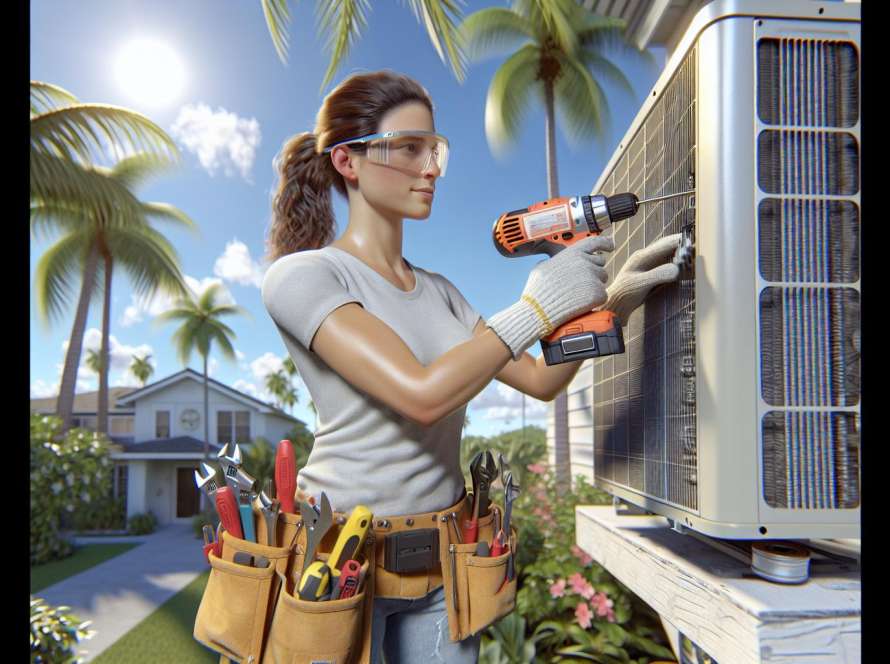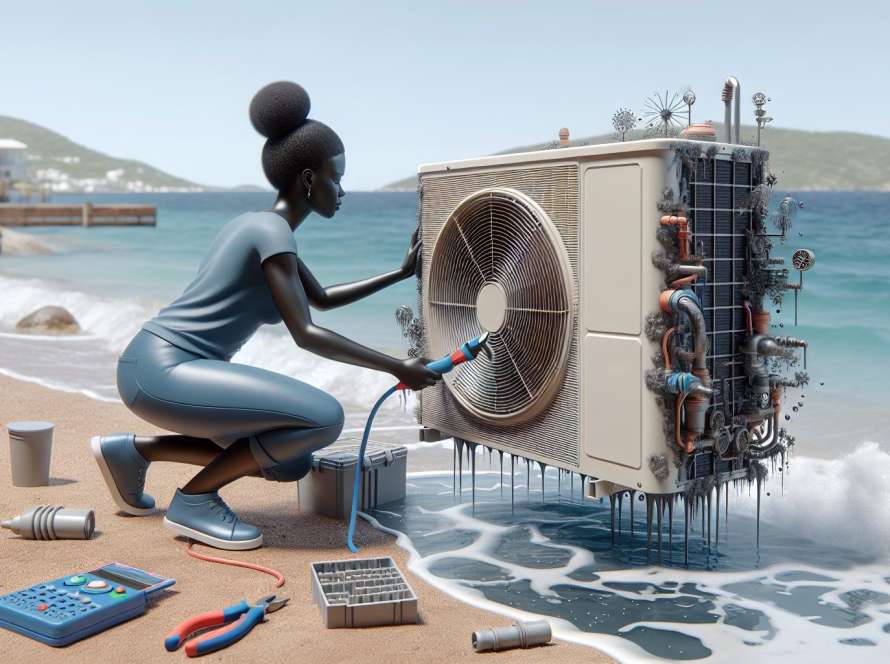When it comes to keeping our AC systems running smoothly in the Florida heat, regular maintenance is key. We all know how brutal the summer months can be, and the last thing we want is for our air conditioning to fail when we need it most. That’s why investing in optimal AC performance maintenance is crucial for ensuring our comfort and peace of mind.
In this article, we’ll explore the importance of proper AC maintenance in Florida and how it can help us avoid costly repairs and inconvenient breakdowns. From checking refrigerant levels to cleaning filters and inspecting ductwork, there are numerous steps we can take to keep our AC units operating efficiently. Let’s dive into the world of AC maintenance and discover how we can keep our cool all year round in the Sunshine State.
Importance of Regular AC Maintenance in Florida
In Florida, where the scorching heat of the sun is a daily reality, regular AC maintenance is crucial to ensure our comfort and well-being. By investing in routine upkeep, we can avoid unexpected breakdowns and costly repairs, keeping our AC units running efficiently throughout the year.
For Beginners: Basic Maintenance Steps
- Change your air filters regularly to maintain good indoor air quality and keep your AC system running smoothly.
- Clean the condenser and evaporator coils to prevent dirt build-up and maintain optimal cooling performance.
- Check and clear the condensate drain to prevent clogs and potential water damage in your home.
- Inspect the thermostat settings to ensure they are properly calibrated and cooling your home effectively.
For Intermediate Users: Enhancing Efficiency
- Schedule annual professional maintenance to have a technician inspect and tune up your AC unit for peak performance.
- Seal any air leaks in your ductwork to prevent cooled air from escaping and improve energy efficiency.
- Monitor refrigerant levels and have them adjusted if needed to avoid strain on your system.
- Consider installing a programmable thermostat for better temperature control and energy savings.
- Perform regular airflow checks to assess the efficiency of your system and make adjustments as needed.
- Invest in regular duct cleaning to remove dust, debris, and allergens that can impact air quality and system performance.
- Evaluate your insulation levels to ensure your home is properly sealed and maximizing energy efficiency.
- Explore the option of upgrading to a more energy-efficient AC unit for long-term cost savings and environmental benefits.
Checking Refrigerant Levels

When it comes to optimal AC performance maintenance in Florida, one crucial aspect to monitor is Checking Refrigerant Levels. This essential step ensures that your air conditioning system runs efficiently and effectively, especially in the hot and humid climate of Florida. Whether you’re a beginner or an expert in AC maintenance, here are some valuable tips to guide you through this process:
For Beginners: Mastering the Basics
- Understand the importance: Refrigerant is the lifeblood of your AC system, responsible for cooling the air that circulates in your home.
- Identify the refrigerant type: Different AC units use various types of refrigerants, so make sure you know which one your system requires.
- Look for signs of low refrigerant: If you notice warm air blowing from the vents or ice buildup on the coils, it could indicate a refrigerant leak.
- Schedule regular checks: Ideally, have a professional inspect and recharge your refrigerant levels annually to keep your AC running smoothly.
For Intermediate DIY Enthusiasts: Enhancing Your Maintenance Routine
- Invest in a refrigerant gauge: Purchase a gauge to measure the pressure of the refrigerant in your system accurately.
- Follow safety precautions: Remember to turn off the power to your AC unit before attempting to check the refrigerant levels.
- Locate the service valves: Familiarize yourself with the location of the service valves where you can connect the gauge to check the levels.
- Monitor pressure readings: Refer to the manufacturer’s guidelines to ensure that the pressure readings fall within the recommended range.
- Perform leak detection: Utilize advanced leak detection tools like UV dye or electronic leak detectors to pinpoint and repair refrigerant leaks.
- Consider refrigerant upgrades: If your AC unit uses older refrigerants like R-22, consult with a professional about transitioning to more environmentally friendly options.
- Opt for professional maintenance: Periodically hire a certified technician to conduct a comprehensive inspection and maintenance of your AC system, including checking refrigerant levels.
- Optimize refrigerant charge: Fine-tune the refrigerant levels to the manufacturer’s specifications for maximum efficiency and performance.
Cleaning Air Filters
When it comes to maintaining optimal AC performance in Florida, Cleaning Air Filters is a crucial step that can make a significant difference. Whether you’re a beginner or an experienced DIY enthusiast, ensuring that your air filters are clean can improve air quality, reduce energy consumption, and extend the lifespan of your HVAC system. Here’s a breakdown of how you can tackle this task based on your experience level:
For Beginners: Mastering the Basics
- Locate the air filter: It’s typically found behind the return air grille or within the air handler unit.
- Turn off the HVAC system: For safety, make sure the unit is not running while you work on the filter.
- Remove the filter: Slide out the old filter carefully, noting its size for replacement.
- Inspect and clean: If the filter is reusable, gently clean it with a vacuum or mild soap and water solution.
- Install the filter: Place the cleaned or new filter back into the unit, ensuring it faces the correct direction as indicated on the frame.
For Intermediate DIY Enthusiasts: Enhancing Your Maintenance Routine
- Upgrade your filter: Consider a higher efficiency filter to trap more dust and allergens.
- Set a regular schedule: Aim to check and clean or replace your filters every 1-3 months, depending on usage.
- Consider air purifiers: Supplement your HVAC system with portable air purifiers for added indoor air quality.
- Seal air leaks: Ensure that your ductwork is properly sealed to prevent debris from entering the system.
- Perform a thorough inspection: Check for mold, mildew, or pest infestations in the ductwork and around the filter area.
- Use a pressure washer: For reusable filters, a pressure washer can provide a deeper clean.
- Invest in HEPA filters: High-efficiency particulate arrestance (HEPA) filters are excellent for trapping fine particles.
- Consider UV lights: Install UV light systems to kill microbial growth within the HVAC system.
Remember, clean air filters not only promote better airflow and energy efficiency but also contribute to a healthier indoor environment for you and your family. Stay proactive in maintaining your filters to enjoy a well-functioning AC system year-round.
Inspecting Ductwork
When it comes to maintaining optimal AC performance in Florida, inspecting ductwork plays a crucial role. Whether you’re new to HVAC maintenance or have some experience, ensuring your ductwork is in top condition is essential for efficient cooling and indoor air quality. Here’s a breakdown based on different experience levels:
For Beginners: Checking for Visible Issues
- Start by visually inspecting your ductwork for any signs of damage like holes, cracks, or disconnected sections.
- Look for dirt, dust, or debris buildup inside the ducts that can affect airflow and indoor air quality.
- Ensure that all connections are tightly sealed to prevent air leaks that can decrease efficiency.
For Intermediate Maintenance Enthusiasts: Going Beyond the Surface
- Use a flashlight to peer into the ductwork for mold growth, pest infestations, or moisture accumulation that can lead to air quality issues.
- Consider hiring a professional duct cleaning service for a more thorough inspection and cleaning if needed.
- Check for any obstructions like furniture or boxes blocking vents that impede proper airflow.
- Perform a duct leakage test to assess the efficiency of your ductwork system and identify areas that require sealing.
- Use a smoke pencil or infrared camera to detect air leaks and insulation deficiencies that impact cooling efficiency.
- Consider upgrading to insulated ductwork or implementing zoning systems for precise temperature control in different areas of your home.
By regularly inspecting your ductwork, you can ensure that your HVAC system operates at its peak performance, delivering optimal cooling and indoor air quality in your Florida home. Remember, a well-maintained ductwork system not only enhances comfort but also contributes to energy efficiency and cost savings in the long run.
Conclusion
Ensuring optimal AC performance in Florida requires diligent ductwork maintenance. By visually inspecting for damage, dirt, and proper sealing, beginners can contribute to efficient cooling. Intermediate maintenance enthusiasts should also check for mold, pests, and obstructions, considering professional cleaning when needed. Conducting duct leakage tests and utilizing tools for detection are essential steps. Upgrades like insulated ductwork or zoning systems can enhance efficiency. Regular inspections are key to peak HVAC operation, promoting comfort, energy efficiency, and long-term cost savings. Prioritizing ductwork maintenance leads to improved indoor air quality and cooling performance, creating a comfortable environment while maximizing energy efficiency.

